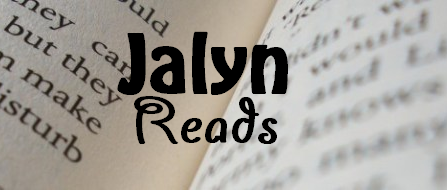So I started writing reviews, and found out I loved it. For years, I collected reviews with nowhere to put them. It’s probably a good thing I didn’t start a blog right away, because my early reviews were awful. But I got better with practice, and when I discovered you don’t have to be a tech geek to have a blog, I started posting my reviews online.
Jalyn – 31 May 2013
About Reviewing
How did you get started?
Surprisingly enough, it was my mom’s idea. I was maybe eleven, and she suggested that I ought to start a book review website. (That was back before I spent a lot of time online and knew there were sites like Goodreads.)
So I started writing reviews, and found out I loved it. For years, I collected reviews with nowhere to put them. It’s probably a good thing I didn’t start a blog right away, because my early reviews were awful. But I got better with practice, and when I discovered you don’t have to be a tech geek to have a blog, I started posting my reviews online.
How do you review a book? Is it a read first, and then make notes, or do you make notes as you go along?
I hardly ever take notes, unless you count mental ones. I read the whole book straight through with as few interruptions as possible. Then I let it sit for a day or two – I find I can articulate my thoughts better if I ignore it for a bit.
Then I sit down at the computer and write a basic outline of what I want to cover – characters, plot, setting, any details that stood out to me, anything I particularly loved or hated. Then I write the thing.
Anywhere from an hour to three days later, I’ll upload it to my blog, add a cover image and categorize it, and proofread to make sure my ideas make sense and flow in a logical order. Sometimes, edits are required.
What are you looking for?
In general, a perfect book. But more specifically? Quirky characters I can fall in love with, a plot that I can’t guess the ending to, a setting that’s a character in itself, tension that leaves me emotionally wiped out – in a good way – at the end, and a distinct voice that I want to imitate.
But if you can come up with a plot I won’t guess the major twists of within the first third of the book, I’ll take that, too.
If a book has a great plot, great characters, but the grammar is less than perfect, how do you deal with that?
I tell it like it is. If it’s only an instance or two, I probably won’t mention it. If it’s mild or only one or two reoccurring issues, I’ll give it a sentence or two somewhere. If it’s really bad, though, it may get its own paragraph of criticism.
Grammar is a pet peeve of mine, so I try not to be too harsh. It can affect my final judgment, though, and it can cause me to knock off a star on a retailer’s site.
How long does it take you to get through, say, an eighty thousand-word book?
Three to four hours, if I read it straight through. If I have a lot going on, though, it can take up to a week.
How did you come up with your rating system, and could you explain more about the rating system?
I don’t use a rating system unless I’m forced to – reviewing a book on Amazon, for instance. I’m a big fan of objectivity in reviews, but I think rating systems can be a little too objective. To me, there’s a huge difference between 3 stars because I didn’t care about the characters and 3 stars because it was a four-star book with grammar problems.
Instead of a rating, I use my last paragraph or so to say whether or not I’d read the book again, recommend it to people, and/or read anything else by that author. So, in a way, my last paragraph is a little like a rating – just not quite as straightforward as a 5-star system.
What advice could you give to authors looking to get their books reviewed?
Read the review policies! I know it sounds like a no-brainer, but I was surprised at how many people didn’t. I’ve had some offers of nonfiction when I clearly state I don’t review nonfiction. One person left a comment, despite my “DO NOT leave a comment asking me to review your book” warning. Those were all automatic rejects.
Other than that, write the best blurb you can, be polite, don’t promise I’m going to love your book, and be as grammatically correct as possible. If I say no, don’t argue. And for goodness’ sakes, spell my name right!
Do you get readers emailing you and thanking you for a review?
No, but I do get comments sometimes. One reader commented to say my review made her want to read the book, which is really awesome. I also love it when authors comment and thank me for reviewing their book – if you ever want to get into a reviewer’s good graces, that’s the way to do it.
My advice to authors on getting a “bad” review (hasten to add that might mean a perfectly honest, well written, fair review – just bad from the author’s point of view) is to take what you can from it and move on. Under no circumstances to “argue” with the reviewer – would you agree with that?
In general, yes, especially if the reviewer’s problem with the book was a personal opinion. But in some cases, I think there can be circumstances where the author should argue – or at least ask for clarification.
For instance, I recently recommended an Indie author hire a copyeditor to fix his punctuation before the sequel to the book I reviewed came out. He emailed me to say that he actually did hire a copyeditor, and he wanted to see some examples. He was very polite about it, and I don’t think his response was uncalled-for. If he hired a copyeditor and reviewers are still complaining about bad punctuation, it seems to me he’s justified in either convincing me I was wrong or taking some examples to his copyeditor.
About Reading
We talk a lot about writing here on the blog, and possibly not enough about reading, which is after all why we’re all here. Why do you think people love reading? We’re seeing lots of statistics that say reading as a pastime is dying – do you think that’s the case?
In my experience, you can find a study to support whatever point you want to make. If you want to prove reading as a pastime is dying, there’s stats for that. If you want to prove it’s growing, there’s stats for that, too.
Personally, I don’t think reading for fun will ever die. While there may be a smaller percentage of people who get hooked on reading, people who are hooked aren’t ever going to stop. And I believe that no matter how unpopular it becomes, there will always be some geeks like me who love to read no matter what.
About Writing
What are the most common mistakes that you see authors making?
The biggest one I’ve found is long paragraphs. This isn’t a big deal for a lot of genres, like historical and contemporary, but I read mostly sci-fi and fantasy-type stories. Those genres are best when they’re more fast-paced with snappy writing. Up to a point, the shorter paragraph the better with those genres.
Another big one is prologues. Sometimes, prologues are necessary, but most of the time, they’re not. Usually they read like irrelevant information trying to make you want to read on.
Most authors could also stand to follow Mark Twain’s writing advice: “As to the adjective: When in doubt, strike it out.” Description is a place where I see a lot of new authors overdoing it. I think their best bet would be to only describe what’s necessary to the story, and leaving the rest to the reader’s imagination.
We’re told that the first page, paragraph, chapter, is absolutely key in making or breaking a book. Agents typically request only the first five pages of a novel, what do you think about that; if a book hasn’t grabbed you by the first five pages, do you put it down?
Not generally. I’ll make a mental note that the beginning wasn’t great, and give it a hundred pages to hook me. (Sometimes I reduce that to fifty or seventy-five if it’s a short book, but I usually try to go with the hundred-page rule.) If I just don’t care after a hundred pages, I’ll put it down and write a review explaining why I didn’t finish it.
On the flip side, if I’m hooked after the first five pages, chances are I won’t put it down even if I don’t care at the hundred-page mark.
The only time I’ll put a book down after the first five pages is if I come across something I personally will not read about on principle – homosexuality, explicit sex, etc. I try to avoid those kinds of books, but every once in a while, that subject matter slips in.
Is there anything you will not review?
I try to be somewhat picky about the books I read. I won’t read erotica, horror, nonfiction, poetry, romance (although I don’t mind romantic elements), or westerns. As far as subject matter in other genres goes, I try to avoid explicit sexuality, homosexual relationships, and extreme violence. Sometimes, those can be difficult to avoid, and result in me not finishing some books on principle.
About Publishing
What do you think of the oft quoted comment that the “slush-pile has moved online”?
I think it can be true. One of the stereotypes of a self-published book is one that was rejected by agents or editors, so the author published it online himself. And in some cases, it’s obvious that this was a slush-pile book.
But I don’t think it’s true in all cases, though. Not every rejected writer self-publishes an ebook. And not every self-published ebook was ever offered to a traditional publisher. Some authors intend to self-publish from the get-go.
Not all online books were from the slush pile. I think the more accurate way to phrase it would be, “some of the slush pile has moved online.”
Do you think attitudes are changing with respect to Indie or self-published titles?
Definitely. It used to be self-publishing was for people who couldn’t make it in “real” publishing, or people who didn’t want to put in the effort. Heck, it was called “vanity publishing” until recently.
There’s less of a stigma now than there used to be, especially with the advent of hybrid publishing – people self-publishing in addition to traditional publishing. I won’t say there’s no stereotypes about self-published or Indie books, because honestly, some of them do need a good editor. But for the most part, I think people are realizing that an Indie or self-published book can be just as much a “real” book as a traditionally-published one.
Do you have any ideas or comments on how the industry can “filter” good from bad, aside from reviews?
I can’t think of anything. To me, reading what other people have to say about a book is the best way of figuring out if I want to read a book or not.
End of Interview:
You can read Jalyn’s reviews at her website, Jalyn Reads.




2 responses to “IndieView with reviewer Jalyn of Jalyn Reads”